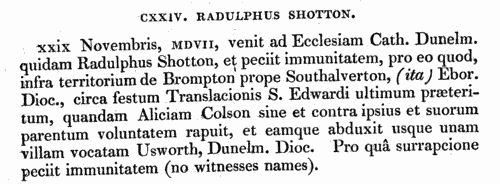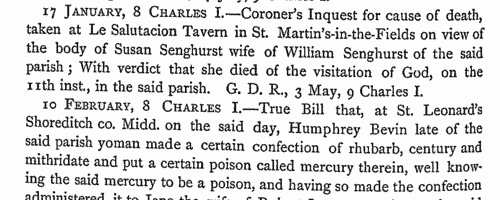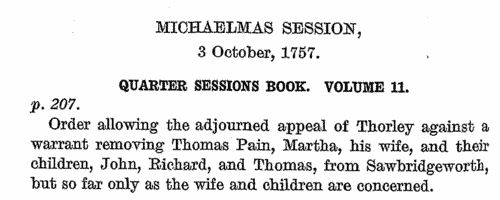Pewter Surname Ancestry ResultsOur indexes 1000-1999 include entries for the spelling 'pewter'. In the period you have requested, we have the following 10 records (displaying 1 to 10): Buy all | | | Get all 10 records to view, to save and print for £60.00 |
These sample scans are from the original record. You will get scans of the full pages or articles where the surname you searched for has been found. Your web browser may prevent the sample windows from opening; in this case please change your browser settings to allow pop-up windows from this site. Murderers sheltering in Durham Cathedral: and their victims
(1464-1524)
Criminals could evade pursuit by claiming sanctuary in Durham Cathedral. Persons who took refuge fled to the north door of the cathedral, and knocked for admission. There were two chambers over the door in which men slept, for the purpose of admitting fugitives at any hour of the night. As soon as anyone was so admitted, the Galilee bell was immediately tolled, to give notice that someone had taken sanctuary. The offender was required to declare before witnesses the nature of his offence, and to toll a bell in token of his demanding the privilege of sanctuary. He was then provided with a gown of black cloth with a yellow cross, called St Cuthbert's Cross, upon the left shoulder. A grate was provided near the south door to sleep upon, and for 37 days sufficient provisions and bedding were provided. But within 40 days he had to appear before the coroner, clothed in sackcloth, and be branded on his right hand with the sign of the letter A. This signified that he was swearing to abjure the realm: he was then free to leave the country unhindered. The petitions for immunity were entered in the diocesan registers, usually with the marginal note 'Peticio Immunitatis': those from 18 June 1464 to 10 September 1524 (the privilege was finally abolished in 1624) were edited and printed by the Surtees Society in 1837 under the title Sanctuarium Dunelmense. Some of the criminals came from a considerable distance: the great majority were murderers or homicides. Each entry usually gives full name, original address, (often) trade, a brief description of the crime, often with date, and usually the name of the victim, as well as the witnesses to the petition. This index covers all the surnames given.PEWTER. Cost: £4.00.  | Sample scan, click to enlarge

| Worcestershire Quarter Sessions
(1615)
J W Willis Bund compiled this abstract of surviving records from the Worcestershire quarter session rolls for the Records and Charities Committee of the Worcestershire County Council. This text, extending as far as 1621, was published in 1899: the entries are arranged by year under the headings Recognizances, Indictments, and Miscellaneous. PEWTER. Cost: £4.00.  | Sample scan, click to enlarge

| Middlesex Recusants
(1625-1666)
Incidents from the Middlesex Sessions Books. These are abstracts of sessional orders, minutes of criminal cases, memoranda and other entries of record taken from the volumes of Gaol Delivery Register, Books and Rolls, Sessions of Peace Register, and Process Books of Indictments for the county of Middlesex from the death of king James I to the Great Fire of London. The references at the end of each item indicate the volume in question, the abbreviations being G. D. for Gaol Delivery, S. P. for Sessions of Peace, and S. O. T. for Session of Oyer and Terminer; occasionally preceded by S. for Special or G. for general, or followed by R. for Roll or Reg. for Register. It should be noted that, in the case of 'true bills' or indictments, the abstract starts with the date on which the offence took place, the date of the conviction &c. being at the end of the entry. There are many records of recusants, that is Protestants and Roman Catholics who failed to attend Church of England services. These abstracts, prepared by John Cordy Jeaffreson for the Middlesex County Record Society, are far from being a complete calendar of these extensive records; his purpose was, in part, to notice 'every parchment that should exhibit a famous person's name or any other feature of personal interest'. Being unable to print in full the longer lists of the conventiclers and recusants recorded, he ignores 'those persons who appear from their descriptions to have been of humble degree'.PEWTER. Cost: £4.00.  | Sample scan, click to enlarge

|  Masters and Apprentices
(1745) Masters and Apprentices
(1745)
Apprenticeship indentures and clerks' articles were subject to a 6d or 12d per pound stamp duty: the registers of the payments usually give the master's trade, address, and occupation, and the apprentice's father's name and address, as well as details of the date and length of the apprenticeship.PEWTER. Cost: £8.00.  | Sample scan, click to enlarge

|  Apprentices
(1777) Apprentices
(1777)
Apprenticeship indentures and clerks' articles were subject to a 6d or 12d per pound stamp duty: the registers of the payments usually give the master's trade, address, and occupation, and the apprentice's name, as well as details of the date and length of the apprenticeship. 2 January to 31 December 1777. IR 1/29PEWTER. Cost: £8.00.  | Sample scan, click to enlarge

| Hertfordshire Sessions
(1752-1799)
Incidents from the Hertfordshire Sessions Books and Minute Books. These cover a wide range of criminal and civil business for the county: numerically, the most cases (362) concerned assaults and rioting, and larceny (378), but there is a large variety of other matter, as extensive as the jurisdiction of the courts. These highly condensed abstracts of the entries were prepared by William le Hardy, and published for the County Council in 1935. PEWTER. Cost: £4.00.  | Sample scan, click to enlarge

| Maldon Poll: Voters Resident in Maldon and the country
(1826)
On 7 June 1826 and the fourteen following days (Sundays excepted) a poll was held to elect Members of Parliament to represent the borough of Maldon in Essex. The candidates were the Hon. George Mark Arthur Way Allanson Winn (W) of Warley Lodge, who received 1747 votes; Thomas Barrett Lennard (L) esquire of Regent's Park, London, 1454 (or 1455) votes; and Quintin Dick (D) esquire of Curson Street, London, 1401. In all 3113 electors were polled, 2527 living in Maldon and the country, 586 in London and its environs. This poll book is divided into two sections, the 586 voters from London &c being listed separately. The names are listed alphabetically by surname, then christian name(s), occupation (in italics), address; and the right-hand column shows the votes cast. Those who did not vote are not listed.PEWTER. Cost: £6.00.  | Sample scan, click to enlarge

|  Outstanding soldiers of the 66th (Berkshire) Regiment of Foot
(1875-1881) Outstanding soldiers of the 66th (Berkshire) Regiment of Foot
(1875-1881)
Each year the best soldiers of the regiment were chosen for long service and good conduct medals. This register gives rank, name, regimental number, and date of recommendation. (The sample scan is from the 34th foot). The register is essentially a register of recommendations, but from 1877-8 onwards there are also details of the issue of the medals. The regiment returned to England from the East Indies in 1881, having taken part in the Afghan war of 1879 to 1880, including the battle of Candahar.PEWTER. Cost: £8.00.  | Sample scan, click to enlarge

|  Scots Guards fighting in Egypt
(1882) Scots Guards fighting in Egypt
(1882)
The war medal roll for the Egyptian campaign of 1882 is annotated to show those men actually present at Tel-el-Kebir, and thereby also entitled to the Tel-el-Kebir clasp. In addition, there follows an almost duplicate roll of men entitled to the Bronze Star granted by the Khedive of Egypt in recognition of the campaign. The 1st battalion, The Scots Guards, took part in the 1882 campaign, including the battle of Tel-el-Kebir, and added Egypt, 1882 and Tel-el-Kebir to the regimental honours. The battalion had returned home before the end of the year.PEWTER. Cost: £8.00.  | Sample scan, click to enlarge

| Masters of Merchantmen Lost at Sea by Stranding
(1897-1898)
Abstracts of the returns made to the Board of Trade of shipping casualties which occurred on or near the coasts or in rivers and harbours of the United Kingdom; and to British vessels elsewhere; and to foreign vessels on or near the coasts or in the rivers and harbours of British possessions abroad (including the Great Lakes of North America). The tables are arranged into the broad divisions of Total Losses at Sea (founderings, strandings, collisions, other causes, and missing); Partial Losses at Sea (founderings, strandings, collisions and other causes); Total Losses in Rivers, Lakes and Harbours (founderings, strandings, collisions and other causes); and Partial Losses in Rivers, Lakes and Harbours (founderings, strandings, collisions and other causes). In each case they state (so far as known) the date; name and age of the vessel; port of registry (if British); class in Lloyd's Register, Liverpool Book or Bureau Veritas; description of vessel, and whether iron (I.) or wood (W.); tons; number of crew; name of master (usually surname and initials); name and address of owner(s); port sailed from; port bound to; cargo and number of passengers (if any); number of lives lost; wind (direction and strength); and place of casualty. July 1897 to June 1898
PEWTER. Cost: £6.00.  | Sample scan, click to enlarge

|
Research your ancestry, family history, genealogy and one-name study by direct access to original records and archives indexed by surname.
|













